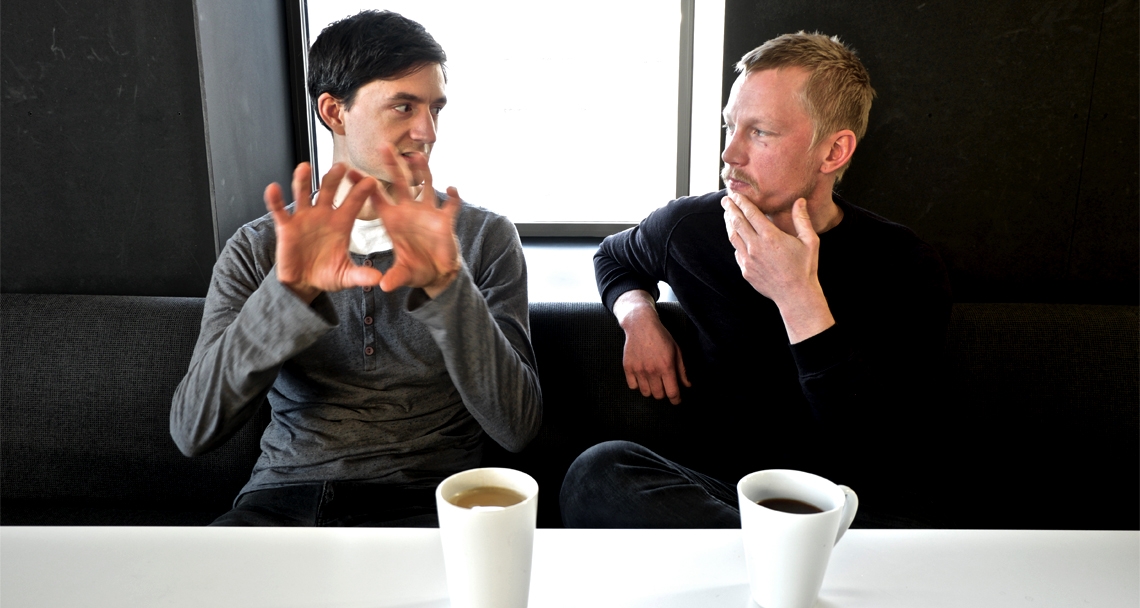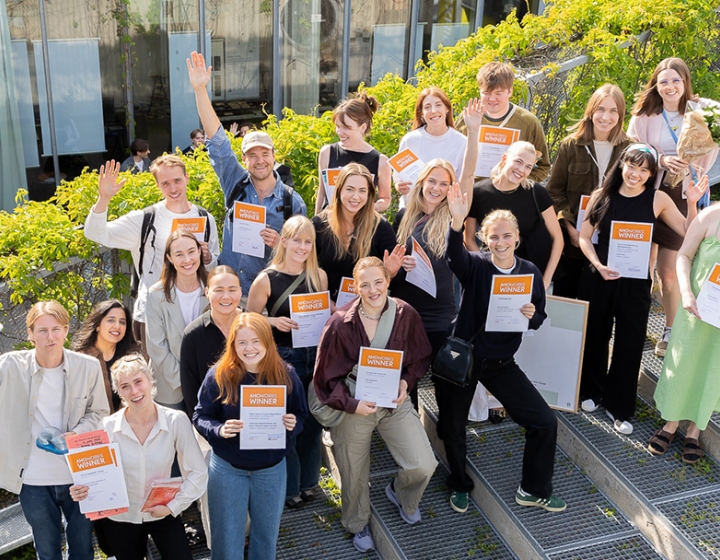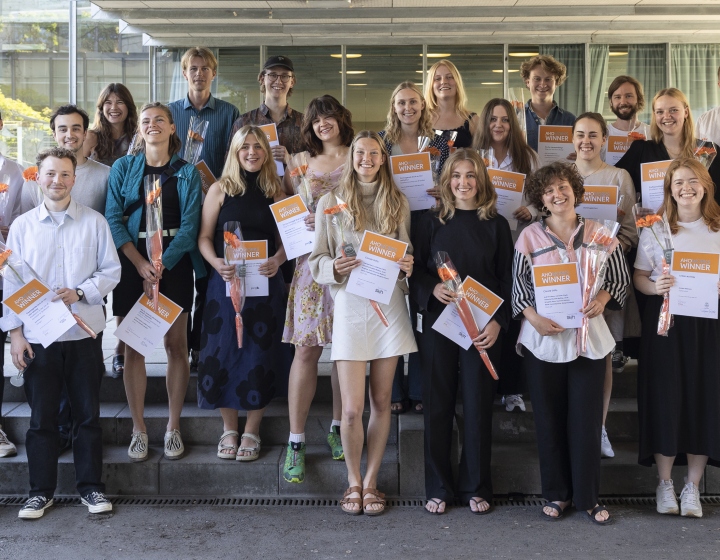Student chat: Hans Eriksson & Matthew Poot
Meet Hans Eriksson (Sweden) and Matthew Poot (Canada), currently doing their diploma in Landscape Architecture in the Arctic University of Norway (UiT) in Tromsø. They are the second group of students to finish their diploma from the Tromsø-studio, which is a collaboration between AHO and UiT.
How is it to live in Tromsø?
Matthew: There is a lot of really beautiful nature just outside the doorstep; it is nice to be surrounded by nature, almost 360 degrees! For the size it is so much going on, and you have all the benefits of not being in a big city; it is quiet, little traffic, and you are free to move around the city. We are very lucky to experience the northern lights, and it usually shows when you least expect it. Sometimes I have worked until really late and then when I walk back home, it all of a sudden appears on the sky.
Hans: Tromsø has the advantage of being a small city, you bump into people you know, and it doesn't create this feeling of detachment that certain larger cities might do. However, it is large enough so you can be anonymous if you want to. Also, people are really happy to help and the locals are interested in the work we do here in the studio.
What are you working on for the moment?
Hans: I have chosen the Old, Soviet mining village of Barentsburg on Svalbard for my Diploma. I am working on the geological, cultural and ecological layer, and will, through a reorganising process, try to tell a story about the two important materials coal and black soil, which have affected this particular place for a long time. Using these two materials I am trying to reveal the history, to make a place for people to reflect upon the history of this place and also to make a place where the scientists can study succession in Barentsburg.
Matthew: Most of the students focus on the arctic and subarctic environment; however, I am working with the Sahel region in Mali, which has a very dynamic climate, bordering the Sahara desert. For a long time I have been interested in extreme environmental conditions and that was why I chose to study here in Tromsø. My diploma challenges universal approaches to building hydro-agricultural infrastructure by connecting them to human dynamics and cultural context. The project is aiming to transform the rigid water infrastructure systems into more dynamic and flexible forms which reflect natural processes and traditional practices of the local people that are embedded into the landscape.
How is student life in UiT?
Hans: There are a lot of students in Tromsø, and a lot of enthusiasm. Even though Tromsø is not large there is a lot going on; film festivals, concerts and a very supportive atmosphere. Nature is very accessible and it’s great to be able to combine it with the work in the studio.
Matthew: The department of Landscape Architecture is situated in a transformed Mack brewery in the city center of Tromsø. The studios are spacious and we have a fully equipped kitchen in addition to the studios, library and workshops. Because we share the building with students of contemporary art we also have access to other kind of rooms if we need, like a sound studio or a black box. The fascilities are great, the only thing we miss is a lazer cutter and a 3D printer!
Matthew: There is a lot of really beautiful nature just outside the doorstep; it is nice to be surrounded by nature, almost 360 degrees! For the size it is so much going on, and you have all the benefits of not being in a big city; it is quiet, little traffic, and you are free to move around the city. We are very lucky to experience the northern lights, and it usually shows when you least expect it. Sometimes I have worked until really late and then when I walk back home, it all of a sudden appears on the sky.
Hans: Tromsø has the advantage of being a small city, you bump into people you know, and it doesn't create this feeling of detachment that certain larger cities might do. However, it is large enough so you can be anonymous if you want to. Also, people are really happy to help and the locals are interested in the work we do here in the studio.
What are you working on for the moment?
Hans: I have chosen the Old, Soviet mining village of Barentsburg on Svalbard for my Diploma. I am working on the geological, cultural and ecological layer, and will, through a reorganising process, try to tell a story about the two important materials coal and black soil, which have affected this particular place for a long time. Using these two materials I am trying to reveal the history, to make a place for people to reflect upon the history of this place and also to make a place where the scientists can study succession in Barentsburg.
Matthew: Most of the students focus on the arctic and subarctic environment; however, I am working with the Sahel region in Mali, which has a very dynamic climate, bordering the Sahara desert. For a long time I have been interested in extreme environmental conditions and that was why I chose to study here in Tromsø. My diploma challenges universal approaches to building hydro-agricultural infrastructure by connecting them to human dynamics and cultural context. The project is aiming to transform the rigid water infrastructure systems into more dynamic and flexible forms which reflect natural processes and traditional practices of the local people that are embedded into the landscape.
How is student life in UiT?
Hans: There are a lot of students in Tromsø, and a lot of enthusiasm. Even though Tromsø is not large there is a lot going on; film festivals, concerts and a very supportive atmosphere. Nature is very accessible and it’s great to be able to combine it with the work in the studio.
Matthew: The department of Landscape Architecture is situated in a transformed Mack brewery in the city center of Tromsø. The studios are spacious and we have a fully equipped kitchen in addition to the studios, library and workshops. Because we share the building with students of contemporary art we also have access to other kind of rooms if we need, like a sound studio or a black box. The fascilities are great, the only thing we miss is a lazer cutter and a 3D printer!
Why should students do a semester of exchange or their whole master in Tromsø?
You can either do the 2 year master programme in Arctic Landscape or you can do an exchange; masterstudents of Architecture and Landscape Architecture at AHO are welcome to apply for a semester of exchange in Tromsø.
They will get to experience the Arctic landscape and each year the studio groups travel to various interesting places. During the last years the students have participated in projects in Vardø, Svalbard, Greenland and others locations and the students usually get to visit these places. Because of the climate changes and the shifting geo political situations these vulnerable climates are in flux and therefore highly important to research.
You can either do the 2 year master programme in Arctic Landscape or you can do an exchange; masterstudents of Architecture and Landscape Architecture at AHO are welcome to apply for a semester of exchange in Tromsø.
They will get to experience the Arctic landscape and each year the studio groups travel to various interesting places. During the last years the students have participated in projects in Vardø, Svalbard, Greenland and others locations and the students usually get to visit these places. Because of the climate changes and the shifting geo political situations these vulnerable climates are in flux and therefore highly important to research.



